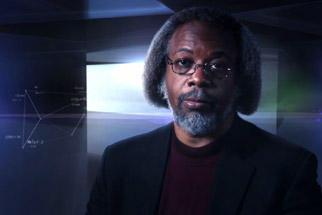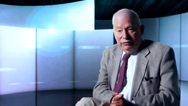Jim Gates on Space
- By David Levin
- Posted 11.10.11
- NOVA
 Listen
Listen
Physicist Jim Gates says that even if you took all the matter out of the universe, space still wouldn't be empty.
Transcript
JIM GATES ON SPACE
Posted: November 10, 2011There's a disconnect between my experience of space—walking around rooms and getting in cars and airplanes—and my thinking about the nature of space and the mathematics I do, trying to steady the universe in which I live. The biggest disconnect? Well, for me the biggest disconnect is why something that seemingly is so simple is, in fact, rather complicated.
So, for example, my hands here are sort of surrounding a region of space. Now, there are air molecules in there, so that doesn't surprise you. But suppose we could remove all the air molecules, every single atom or molecule that's in this intervening area. Then there would be empty space, and you would probably think, "Gee, that's pretty boring." But we've learned in science that if you could drill down to very small scales, you would find out that there's this—even if you've removed all the matter—there's this dynamical something that's left there. And, that's, in fact, the biggest disconnect for us as physicists, that when you think that you've gotten rid of everything, there's still something there.
As a scientist, if you ask me to remove all the matter from the universe, then what I would tell you would be left are the things that we associate with the forces. In nature, there are four fundamental forces: There's the electromagnetic force, there is the strong nuclear force, there is the weak nuclear force, and there's a gravitational force. Each one of these forces is associated with a what we call force-carrying particle. So if you get rid of all the matter, you still haven't gotten rid of all the force-carrying particles, so something is still left.
Credits
AUDIO
- Produced by
- David Levin
- Original interview by
- Graham Judd
IMAGE
- (Jim Gates)
- © WGBH Educational Foundation 2011
Major funding for "The Fabric of the Cosmos" is provided by the National Science Foundation and the Alfred P. Sloan Foundation.
Additional funding for this program is provided by the Arthur Vining Davis Foundations.
Related Links
-

The Fabric of the Cosmos
Acclaimed physicist Brian Greene reveals a mind-boggling reality beneath the surface of our everyday world.
-

Steven Weinberg on Space
The concept of "space" is a tough one to explain, even for a Nobel prize-winning physicist.
-

Sean Carroll on Time
Physicist Sean Carroll says there's no such thing as past or future in the elementary laws of physics.
-

Special Relativity in a Nutshell
Brian Greene explains Einstein's notion of the mutability of space and time in a way you can readily understand it.
You need the Flash Player plug-in to view this content.

